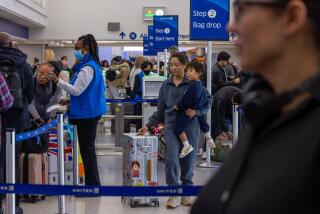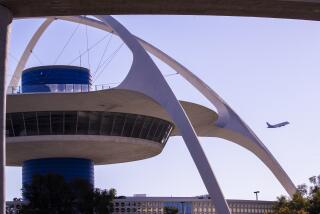Passenger mix-up on flight to Japan caps a year of airline foul-ups
As air travel controversies go, this one ranks low in violence but high in public relations nightmare potential: A puzzling passenger mix-up, a flight to nowhere and a celebrity couple with a massive social media following.
Passengers on what should have been an 11-hour flight from Los Angeles International Airport to Japan were forced to fly back to L.A. four hours into the trek when the captain of the All Nippon Airways plane learned that someone was onboard by mistake.
The incident probably wouldn’t have become a social media firestorm had it not been for the live commentary provided via Twitter by model Chrissy Teigen, who was flying with her husband, singer John Legend. The two combined have more than 20 million Twitter followers.
The snafu caps a year of flying dangerously, at least as far as airlines’ customer service reputations are concerned.
Social media in 2017 repeatedly showcased video and pictures of passengers being ejected from airplanes for a variety of reasons. In the most infamous case, a bloodied physician was dragged down the aisle of a United Airlines flight in April.
Separately, the NAACP, citing a pattern of “disturbing incidents,” warned African Americans that flying on American Airlines could subject them to “disrespectful, discriminatory or unsafe conditions.”
“It happens with regularity that airlines get into some embarrassing situation with travelers,” said Robert Ditchey, a former airline executive and aviation consultant. “You have misunderstandings and other problems that get on the front page of a newspaper, and the airlines have to dig themselves out.”
All Nippon Airways apologized for the boarding error and inconvenience for the 208 passengers on the Tuesday night flight. By early Wednesday, the passengers were back in the air again, headed for Japan.
The unauthorized passenger had a boarding pass for a United Airlines flight but got on the All Nippon Airlines flight with his brother, who had the correct ticket for the flight, said Mike England, a Transportation Security Administration spokesman.
The TSA and the FBI are trying to figure out how the passenger cleared the airline’s gate agent to get on the plane without the proper boarding pass.
Throughout the drama, Teigen posted updates to her Twitter fans: “A flying first for me: 4 hours into an 11 hour flight and we are turning around because we have a passenger who isn’t supposed to be on this plane. Why … why do we all gotta go back, I do not know.”
Experts didn’t question the pilots’ decision to return to L.A., pointing out that commercial pilots must follow safety protocols that take into consideration the flight’s status, the potential threat to the plane and the location of the nearest safe airport for landing.
“The pilot didn’t do anything wrong,” Ditchey said. “It’s a public relations problem now, but it’s not a safety problem.”
The celebrity turnaround debacle is one of many airline mishaps this year, including a computer error at American Airlines that let too many pilots schedule vacation during the busy Christmas holidays, threatening the cancellation of thousands of flights. The airline had to pay double the regular salary to get pilots back in the cockpits for the holiday flights.
Other miscues include a May incident in which a family was removed from a flight to Las Vegas because of a dispute over where to store a birthday cake. Another carrier got into hot water because a giant bunny died on a flight from London to Chicago.
Such incidents are magnified because of the power of social media to relay news and images in real time.
A seat change usually doesn’t make national news. But it happens when the passenger is conservative political commentator Ann Coulter, who launched into a Twitter tirade over her misfortune to be moved to a seat without extra legroom.
Delta Air Lines apologized but fired back at the political firebrand for taking shots at the employees and passengers.
On Tuesday, the Houston Chronicle published an account by a passenger who complained that her first-class seat on a Dec. 18 United Airlines flight from Houston to Washington, D.C., was given to Rep. Sheila Jackson Lee (D-Texas). The woman said she was threatened with removal from the flight after she took a photo of the congresswoman sitting in the disputed seat, but ultimately was reseated elsewhere in the plane and given a $500 voucher.
United said that the passenger had canceled that leg of her trip using a mobile app, which the passenger denied. Jackson Lee said she didn’t request special treatment.
The biggest story was an April incident on a United Airlines regional carrier in Chicago when airport police dragged a 69-year-old passenger, David Dao, from a seat that the airline needed for a crew member. The Kentucky physician suffered a concussion and broken nose, among other injuries, and reached a financial settlement with the airline.
Industry experts say such incidents — although embarrassing and mostly avoidable — are unlikely to diminish the nation’s demand to travel, which has been growing steadily. Along with relatively low fuel costs, the demand has helped the nation’s biggest carriers report hefty profits for the third year in a row.
“These kind of things fade from the public consciousness fairly quickly,” said Anthony Sabino, a professor at St. John’s University in New York and an expert on the airline industry.
Even after the video of Dao being dragged off the United flight, the Chicago-based airline took only a minimal financial hit.
“Some number of people for some period booked away from United but nothing too significant,” said Seth Kaplan, managing partner for industry publication Airline Weekly.
There are even signs that conditions have improved for passengers.
Since Dao was removed from his flight, the nation’s airlines have reduced the rate of passengers bumped from overbooked flights to record lows. Airlines said they have begun offering up to $10,000 to get passengers to voluntarily give up a seat on an overbooked plane.
The NAACP’s complaints involving American Airlines led to plans by the carrier to implement new anti-bias training and a diversity study.
“It’s a pretty decent time right now,” Kaplan said, “for airlines and consumers alike.”
To read more about the travel and tourism industries, follow @hugomartin on Twitter.








